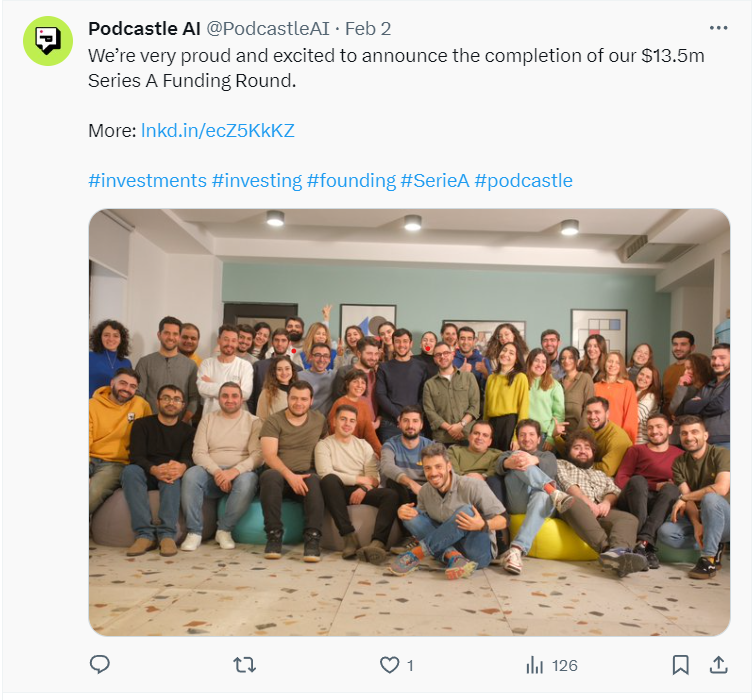
In a Series A funding round led by Mosaic Ventures, Podcastle, a podcasting platform that strengthened its product with numerous generative AI-driven features, has raised $13.5 million.
Existing Podcastle investors RTP Global, Point Nine Capital, Sierra Ventures, and Andrew Ng’s AI Fund were also in attendance. René Rechtman, CEO of Moonbug Media, and Anthony Casalena, CEO of Squarespace, were also participants in the round.
Currently, the platform asserts that approximately one million creators utilise its tools, the majority of which incorporate AI-powered functionalities. However, this number has not been verified independently.
Simon Levene, partner and co-founder of Mosaic Ventures, remarked in a statement: “Arto and the team at Podcastle have built a leading product, and are already showing signs of organic growth that we believe will only accelerate in the years ahead.”
Arto Yeritsyan, the founder and chief executive officer of Podcastle, stated to me: “Last summer we released podcasts for teams. So we’re moving from single-user experience to multiplayer experience. So this funding is aimed to scale that. We saw this scale with 10x growth last year. So basically, we’ll be scaling that.
Podcastle provides the Podcastle Hosting Hub, Revoice, a generative AI voice duplication application, Podcastle for Teams, and Magic Dust AI, which enhances audio quality.
He stated that the platform is focusing on the production of audio and video long-form content: “Basically anything that produces content, which is not like TikTok-type of short-form content. We help teams collaborate, and it covers the entire workflow from ideation into actually getting it to the audience, meaning you can record on our platform, you can then edit or invite somebody to edit.”
Additionally, he believes that the platform distinguishes itself from rivals through the provision of AI and real-time collaboration capabilities.
“We compete with Riverside on the recording side and Descript on the editing side. Descript is desktop-based which you need to install on your computer, whereas we’re web-based and covering the entire flow. So our offering is being a one-stop shop with real-time collaboration on the web. As a comparison, we’d be like Sketch versus Figma. Sketch needed to be installed on your computer, not really web-based or cloud-based where you could collaborate, and Figma basically came in as a collaborative product. So we are pretty similar but for video and audio content creation.”
He intends to utilise both these collaborative features and online editing to his advantage: “In our case, you have the entire workflow within the same product. Podcasters can invite editors and the team can make the edits and can then can invite the marketer to create assets like short-form videos of the long-form video and share it to social, right from the same platform without leaving.”
I also questioned him regarding the most prominent trends in podcasting at the moment.
“The biggest trend is what we call studio sound. Our tools can generate a ‘pseudo quality audio’ from any input. So you can record something on your phone and the output that you get is almost like you’ve been in a studio, even if you’re podcasting with three people, with each of them having a different environment, different distance from the microphone, different noise levels.”
According to him, the development of these tools was prompted by the increasing popularity of video podcasting on YouTube, where it is being promoted. In response, Podcastle implemented video tools to meet this demand. “Regardless of what camera you use, you can generate DSLR camera quality. You can add AI blur or a bokeh effect.”
He also mentions marketing as a significant trend: “We met this with the ability to create a lot of shorts and distribute those to all the social platforms. AI gives you the opportunity to do that automatically, rather than manually, by generating all the assets that you need to share in different platforms to attract users to your long-form content.”
According to him, there is a shift in the way consumers and businesses make decisions from scrolling through websites to observing the content of the company. “They’re going to their YouTube channels, podcasts and listening to that and then making a decision, as opposed to the old ways of doing that.”
I also inquired whether he believes Armenia is transitioning into a greater tech centre, given the emergence of unicorn companies such as Picsart. The engineering team of Podcastle is based in Armenia, a country that is rapidly emerging as a technological centre in Europe due to the presence of offices established by major corporations such as Adobe and Nvidia in their pursuit of programming expertise, particularly in the field of artificial intelligence.
“Yes, definitely. We’re basically becoming a small Silicon Valley here. You will see companies like Adobe building offices. The CEO of Adobe was here last year. We have Nvidia here, and people from companies like Picsart are starting their own companies. I was a VP of Engineering at Picsart for about eight years,” he explains.
Additionally, Damian Sacco has been appointed vice president of growth (previously Prezi), Allan Rechtman, a former vice president at Canva, has been appointed as the company’s chief commercial officer, and Dmitry Kopylovsky has been promoted to chief marketing officer.

Source – https://techcrunch.com/




Leave a Reply